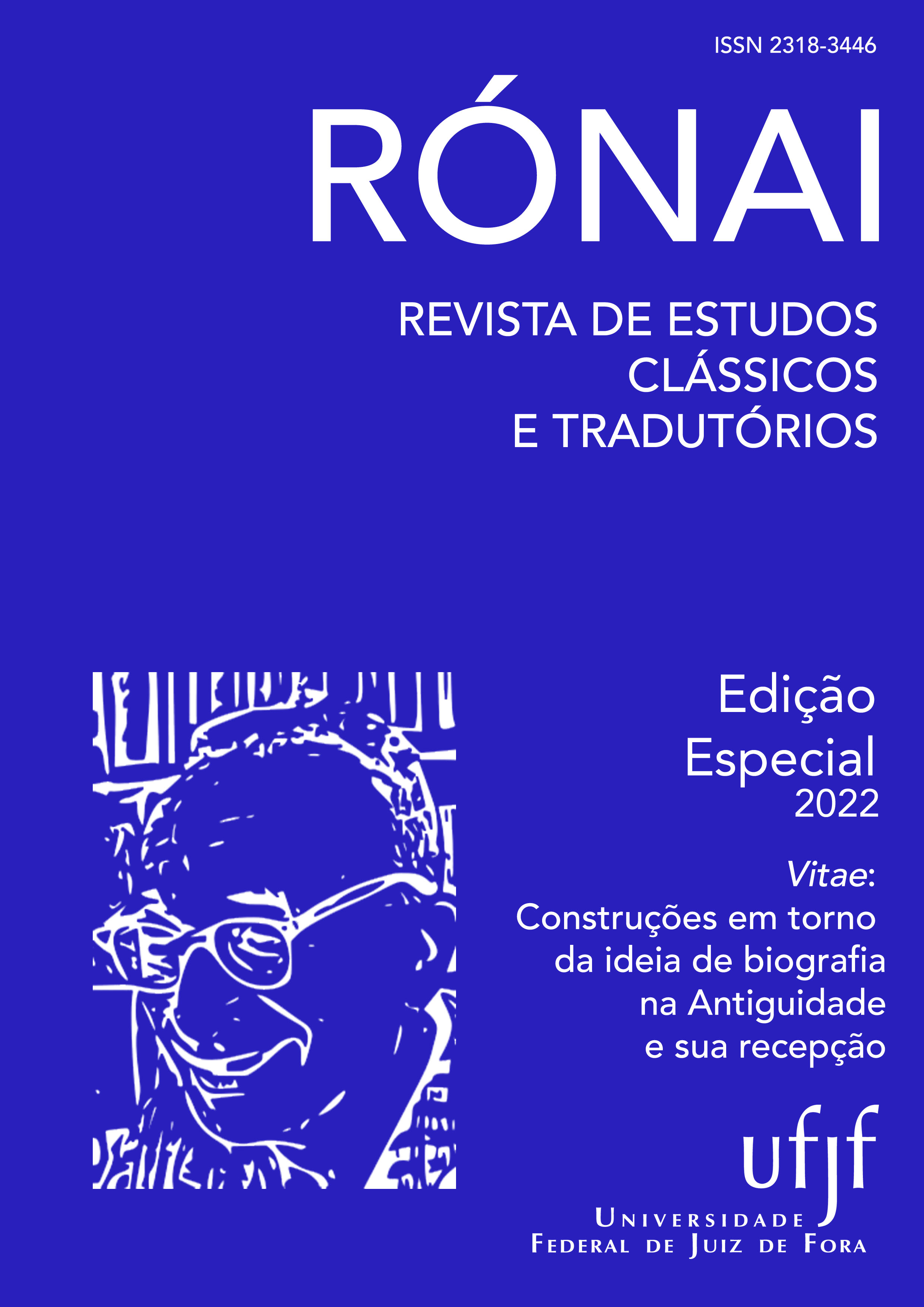Rhetorics, uitae, and reception: the genera dicendi in Virgil’s reception and its echo in the ancient uitae
DOI:
https://doi.org/10.34019/2318-3446.2022.38445Keywords:
genera dicendi, models, genre, Vitae, receptionAbstract
This paper analyses the genera dicendi in the construction of Virgil’s reception. Ancient rhetoric represented a discipline that proposed a first systematic observation of the language (DUCROT & TODOROV, 1998, p. 79), with principles, categories, and method. It gave tools the authors and readers to produce and criticize classic literary works. A valuable source for tracing the course of literary rhetoric and reception is the ancient uitae. Starting from an occurrence on Georgics 2.58, Lucius Annaeus Seneca (Ep. 86), 4 B.C.E. – 65 C.E, proposed a rhetorical synthesis for the understanding of the poem. Servius Honoratus, IV A.D. extends the Senecan synthesis by applying the notion of model, and the ancient uitae, such as the Vita Suetonii uulgo Donatiana (IV A.D.), Vita Philargyrii I (V A.D.), Vita Vossiana (IX A.D.) and Vita Noricensis I (IX A.D.), consolidate the Virgilian reception and tradition. A journey through the mentioned uitae points to the construction of their reception of Virgil in Latin Middle Ages.
Downloads
References
ARISTÓTELES. Poética. Tradução, comentários e índices analítico e onomástico de Eudoro de Souza. São Paulo: Nova Cultural (Os pensadores: Aristóteles, Vol. 2), 1991.
ARISTÓTELES. Retórica. Tradução de Manuel Alexandre Júnior, Paulo Farmhouse Alberto e Abel do Nascimento Pena. São Paulo: Martins Fontes, 2012.
AULU-GELLE. Les Nuits Attiques. Tome II (livres V-IX) Texte établi et traduit par R. Marache. Paris: Les Belles Lettres, 1978.
BONNER, S. F. Education in Ancient Rome from the Elder Cato to the Younger Pliny. Berkeley: University of California Press, 1977.
CICERO. De Oratore. Ed. Kazimierz F. Kumanieck. Leipzig: Teubner, 1969.
CICERO. Orator. Ed. Rolf Westman. Leipzig: Teubner, 1980.
CONTE, G. B. The Rhetoric of Imitation: genre and poetic memory in Virgil and other latin poets. Transl. Charles Segal. Ithacaand London: Cornell University Press, 1986.
COSTA, L. N. Gêneros Poéticos na Comédia de Plauto: traços de uma poética plautina imanente. Tese (Doutorado em Linguística) – Instituto de Estudos da Linguagem, Universidade Estadual de Campinas, Campinas, 2014.
DIONYSIUS of HALICARNASSUS. On Literary Composition: being the greek text of the De Compositione Verborum. Edited with introduction, translation, notes, glossary, and appendices by W. Rhys Roberts. London: Macmillan, 1910.
DUCROT, O. & TODOROV, T. Dicionário Enciclopédico das Ciências da Linguagem. São Paulo: Editora Perspectiva, 1998.
FOWLER, A. Kinds of Literature: an introduction to the theory of genres and modes. Oxford: Clarendon Press, 2002.
GLARE, P. G. W. (Ed.) Oxford Latin Dictionary. 2th ed. Oxford: Clarendon Press, 2012.
HARDIE, P. Virgil (Greece and Rome: New Survey in the Classics. N. 28). Cambridge: The Classical Association, 1998.
HASEGAWA, A. P. Os limites do gênero bucólico em Vergílio: um estudo das éclogas dramáticas. Coleção Letras Clássicas. São Paulo: Humanitas, 2011.
HORACE. On Poetry. Vol. 2: The ‘Ars Poetica’. By C. O. Brink. Cambridge: University Press, 1971.
HORÁCIO. Arte Poética. Introdução, tradução e comentário de R. M. Rosado Fernandes. Lisboa: Editorial Inquérito, 1984.
LAUSBERG, H. Manual de Retórica Literária. 3 Vols. Madrid: Gredos, 1966.
LIVY. Ab Vrbe Condita. Ed. with transl. by Even Sage. Vol. 11, Books 38-39. Cambridge, Massachusetts: Loeb, 1936.
MACROBIUS. Saturnalia. (Vol. I) Ed. Jacob Willis. Leipzig: Teubner, 1970.
MUNIZ, L. A cenografia discursiva das Geórgicas. Tese (Doutorado em Linguística) – Instituto de Estudos da Linguagem, Universidade Estadual de Campinas, Campinas, 2017.
PFEIFFER, R. History of Classical Scholarship: from the beginnings to the end of the Hellenistic age. Oxford: Clarendon Press, 1998.
PLATO. On Poetry: Ion, Republic 376e-398b; Republic 595-608b. Ed. P. MURRAY. Cambridge: University Press, 2003.
QUINTILIANUS. Institutionis Oratoriae Libri Duodecim. Tomus I (Libri I-VI); Tomus II (Libri VII-XII). Ed. M. Winterbottom. Oxford: OCT, 1970.
SANTOS, M. M. O monstrum da Arte Poética de Horácio. Letras Clássicas, n. 4, p. 191-265, 2000.
SENECA. Ad Lucilium Epistulae Morales. Tomus I (Libri I-XIII), Tomus II (Libri XIV-XX). Ed. L. D. Reynolds. Oxford: OCT, 1965.
Thesaurus Linguae Latinae. Online: Access brought by Universidade Estadual de Campinas – UNICAMP.
THILO, G.; HAGEN, H. (eds.) Servii Grammatici qui feruntur in Vergilii carmina commentarii. 3 vols. Hildescheim: Olms, 1986.
THOMAS, R. F.; ZIOLKOWSKI, J. M. The Virgil Encyclopedia. 3 vols. Blackwell: Wiley-Blackwell, 2014.
TREVIZAM, M. Prosa Técnica: Catão, Varrão, Vitrúvio e Columela. Coleção Bibliotheca Latina. Campinas: Editora da Unicamp, 2014.
VERGILIUS. Bucolica et Georgica. Eds. Silvia Ottaviano et Gian Biagio Conte. Teubner. Berlin: De Gryuter, 2011.
ZIOLKOWSKI, J. M. and PUTNAM, M. (Eds.) The Virgilian Tradition: the first fifteen hundred years. New Haven: Yale University Press, 2008.
THOMAS, R. F. and ZIOLKOWSKI, J. M. The Virgil Encyclopedia. 3 vols. Blackwell: Wiley-Blackwell, 2014.
TREVIZAM, M. Prosa Técnica: Catão, Varrão, Vitrúvio e Columela. Coleção Bibliotheca Latina. Campinas: Editora da Unicamp, 2014b.
VERGILIUS. Bucolica et Georgica. Eds. Silvia Ottaviano et Gian Biagio Conte. Teubner. Berlin: De Gryuter, 2011.
ZIOLKOWSKI, J. M. and PUTNAM, M. (Eds.) The Virgilian Tradition: the first fifteen hundred years. New Haven: Yale University Press, 2008.
Downloads
Published
How to Cite
Issue
Section
License
Copyright (c) 2022 Liebert de Abreu Muniz

This work is licensed under a Creative Commons Attribution 4.0 International License.
Copyright
The authors of the published contributions agree with the following items:
1. The authors keep the copyright and convey to the journal the right of first publication, the work being licensed under a Creative Commons Attribution License 4.0 International.
2. The authors are allowed and stimulated to publicize and distribute their work online after the publication in the journal, recognizing first publication in this journal.
3. The authors of the approved works authorize the journal to distribute their content, after publication, for reproduction in content indexes, virtual libraries and similars.
For more information about Creative Commons Attribution License 4.0 International, please, go to: https://creativecommons.org/licenses/by/4.0/deed.en
Editorial exemption
The authors of the published contributions are entirely and exclusively responsible for their contents. Its content does not represent an official position of Rónai - Revista de Estudos Clássicos e Tradutórios neither of Faculdade de Letras da Universidade Federal de Juiz de Fora or their partner institutions.



